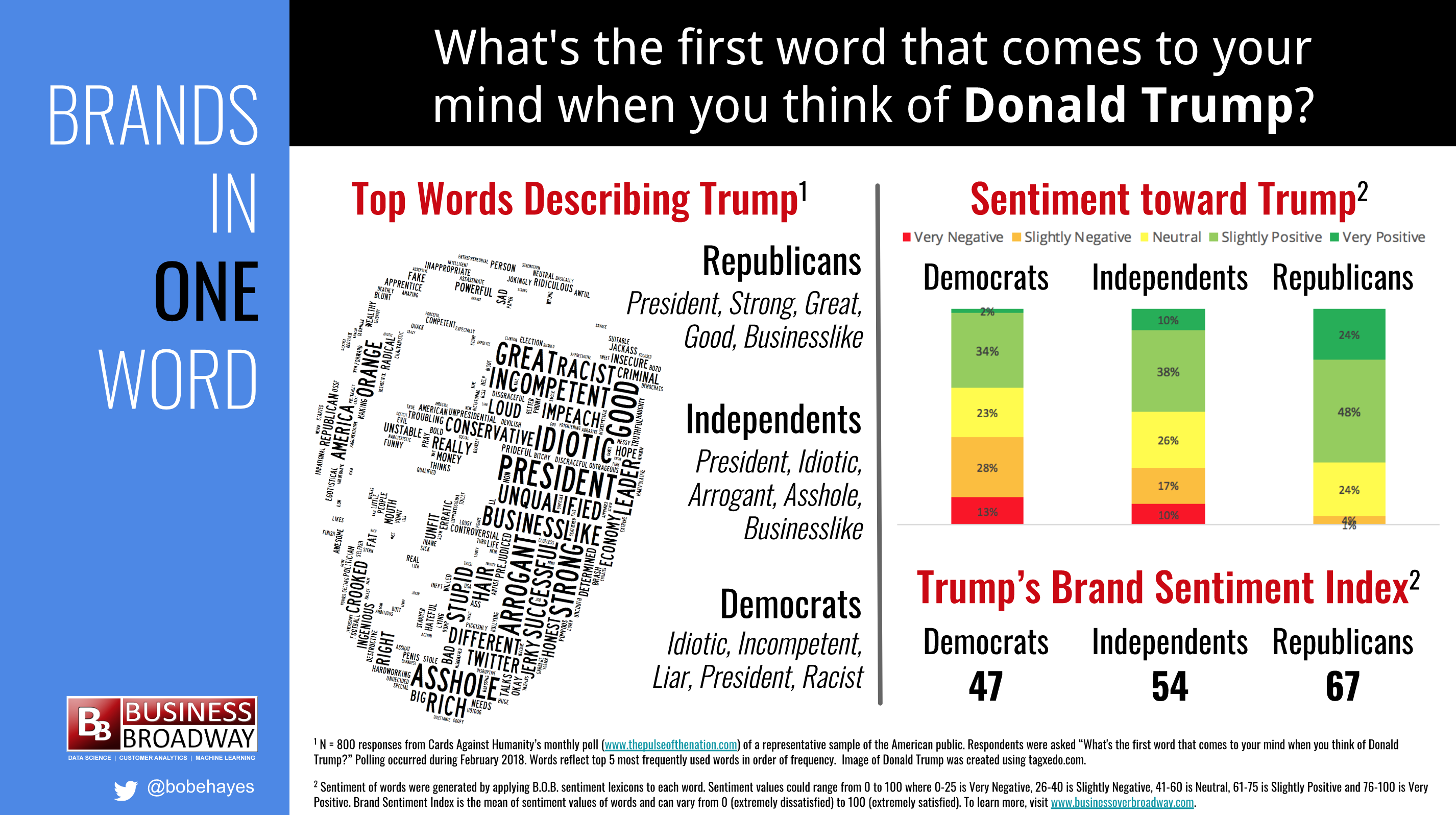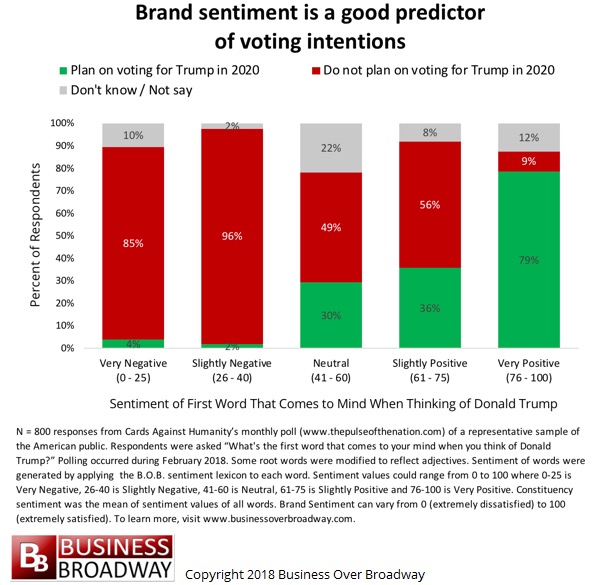A recent political poll of 800 Americans conducted by Cards Against Humanity showed the usefulness of a one-word response to understanding brands. The question used to elicit the one-word response was, “What’s the first word that comes to your mind when you think of Donald Trump?” The top words were: President, Idiotic, Asshole, Liar and Arrogant. Applying my sentiment lexicons to the list of one-word responses, I calculated Trump’s Brand Sentiment Index (BSI) to be 55 (out of 100). Democrats had the lowest sentiment (47) while Republicans had the highest sentiment (67). Also, the BSI was predictive of future voting intentions; that is, respondents with negative sentiment were less likely to vote for Trump in 2020 compared to respondents with positive sentiment). Implications for customer experience management are discussed.
Cards Against Humanity has been conducting a monthly poll (see: www.thepulseofthenation.com) of a representative sample of the American public on various topics and they freely share the raw data of their polls. February’s poll was on politics, and the poll of 800 Americans included typical political polling questions like party affiliation, age, voting intentions (for Trump or not) in 2020 and Trump’s job approval ratings. One of the questions that most interested me was the following open-ended question:
“What’s the first word that comes to your mind when you think of Donald Trump?”
Why does this question interest me? I developed a methodology in which I can use one-word responses to a similar question to gauge respondents’ sentiment or satisfaction toward a brand. That is, I have used this method of transforming words to numbers in a few consulting engagements, including customer and employee surveys. I wanted to apply this method to the current Trump survey data to illustrate the usefulness of this one-word method of measuring satisfaction with brands.
Trump is a Great, Idiotic, Lying, Arrogant, Businesslike, Crazy, Strong President
A total of 745 respondents answered the one-word question. Using a simple word count, the most popular words that first came to mind when thinking of Donald Trump were:
- President (78)
- Idiotic (39)
- Asshole (17)
- Liar (17)
- Arrogant (14)
- Businesslike (14)
- Crazy (14)
- Great (14)
- Incompetent (14)
- Strong (14)
The top words used varied by political affiliation (see Figure 1). Republicans’ top 5 words included (in order of frequency): President, Strong, Great, Good, Businesslike. For respondents who identified as Independents, their top 5 words were: President, Idiotic, Arrogant, Asshole and Businesslike. Democrats’ top 5 words were: Idiotic, Incompetent, Liar, President and Racist.
Trump’s Brand Sentiment Index
Although the question asked for a word, a total of 51 respondents answered using a phrase (they don’t read instructions, me thinks), leaving 694 one-word responses. I ran these words through my sentiment lexicons (for those of you who are interested in how I developed the lexicons, see here, here, here and here). Sentiment lexicons are dictionaries of words with labels specifying their sentiments.
Of the 694 one-word responses, a total of 586 respondents’ words were included in the sentiment lexicons (84% coverage). The sentiment values of the 586 respondents’ words were used in the subsequent analyses regarding brand sentiment. Sentiment values could range from 0 (extremely dissatisfied) to 100 (extremely satisfied).
The Brand Sentiment Index (BSI) is the average of the sentiment values of the words of all respondents. Overall, Trump’s BSI was 55 (with a SD of 22). When I grouped the BSI into broader sentiment categories (0-25 is Very Negative, 26-40 is Slightly Negative, 41-60 is Neutral, 61-75 is Slightly Positive and 76-100 is Very Positive), I found that around 20% of respondents held negative sentiment around Trump (between 0 and 40 on the BSI scale). About 32% of respondents were neutral and 48% of the respondents held positive sentiment around Trump.
There were differences in Trump’s brand sentiment across political affiliation (see Figure 1); about 41% of Democrats held negative sentiment around Trump while only 5% of Republicans held negative sentiment.
What does it mean for Donald Trump?
In the customer experience domain, we know that people’s level of satisfaction toward a brand is related to their propensity to engage in different types of loyalty (e.g., positive) behaviors toward the brand. For example, I found that customers with negative sentiment toward a company (measured using the one-word approach) were not likely to recommend that company to their friends, renew their service contract and expand usage of the brand’s products.
These types of results suggest that Trump’s brand sentiment is related to voting intentions (a comparable loyalty metric in the customer experience domain). In fact, that is what I found in the current data (see Figure 2). Respondents who held negative sentiment around Trump do not plan on voting for Trump in 2020 while respondents who held positive sentiment around Trump do plan on voting for Trump in 2020.
Trump might have a difficult time improving the sentiment around his brand for two reasons. First, sentiment appears to be relatively stable over time, compared to satisfaction and recommendations. Specifically, in a study spanning over 12 months, I found that the correlation between sentiment from time 1 and sentiment from time 2 was r = .60 (for satisfaction, r = 42; for recommendation, r = .27). Customers who tended to report negative sentiment at time 1 tended to have negative sentiment at time 2.
Also, if we look at the top words depicting trump, it appears that many of them (e.g., Idiotic, Liar, Arrogant, Crazy and Incompetent) appear difficult to change, barring a complete personality change on the part of Donald Trump. He would need to be curious enough to want to learn, stop lying (e.g., base his statements on evidence) and bragging.
Summary and Implications for Customer Experience
The current analysis was conducted to illustrate the usefulness of a new method of measuring sentiment that uses a single word. The results revealed that a few important things can be gleaned about a brand using an open-ended question that elicits a one-word response. First, you can learn how people feel (e.g., sentiment/satisfaction) about your brand. The BSI could be a useful alternative to other customer metrics that share the same rating scale as traditional CX questions. Unlike many of the current customer loyalty metrics (e.g., satisfaction, likelihood to recommend), the BSI doesn’t require a rating scale and, therefore doesn’t suffer from the problem of method bias (things being correlated with each other simply because they use the same method of measurement).
Second, using the content of the words that are driving the sentiment values, you can learn about the reasons behind people’s sentiment. Traditional customer satisfaction metrics rely on ratings to reflect customers’ attitudes about a brand/company. So, all you’re using is a single number (the rating) that represents a level of satisfaction. The current method (using words instead of ratings) to elicit attitudes helps you not only capture satisfaction about the target, but also gives you insight behind satisfaction. For Trump, we know that the dissatisfaction of the Democratic constituency largely stems from his lying, arrogance, incompetence and racism. You wouldn’t know this if you used only asked them to provide a rating of their satisfaction. In prior work, I found that companies using this one-word method better understood the reasons for customer satisfaction and employee satisfaction, improving how they communicated their strengths to prospects and applicants, respectively.
Finally, the sentiment behind a single word can be used as a reliable predictor of behavioral intentions. In customer experience management, we are ultimately interested in improving customer loyalty, those behaviors that are beneficial to the company (e.g., customers recommend and stay with the company). The current analysis showed that the one-word method satisfaction predicted voting intentions (the ultimate loyalty indicator in politics). In prior studies, I found that the one-word method of measuring satisfaction was predictive of different types of loyalty behaviors (e.g., recommendation, purchasing and switching).
All companies who use customer surveys rely on traditional rating scales to measure customer satisfaction and manage customer relationships. While this method is good, the one-word, algorithmic-derived method of measuring sentiment provides deeper information about your customers, ultimately helping you measure their satisfaction, understand the reasons behind their satisfaction and identify ways to improve customer loyalty.






 Beyond the Ultimate Question
Beyond the Ultimate Question Measuring Customer Satisfaction and Loyalty (3rd Ed.)
Measuring Customer Satisfaction and Loyalty (3rd Ed.)
Comments are closed.